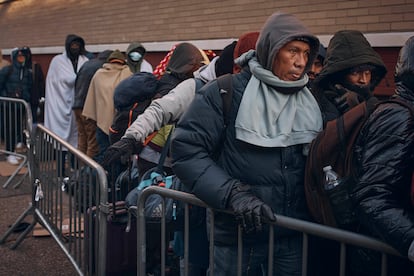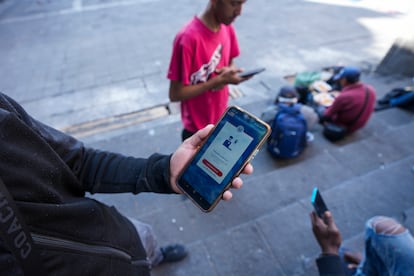US orders migrants who entered on CBP One to leave the country
The Trump administration cancels and invalidates the permits issued by the Biden administration’s app, which granted protection to nearly one million people


The Trump administration has revoked residence and work permits granted through the CBP One program and ordered its beneficiaries to leave the country immediately. Nearly one million individuals who entered the U.S. via this immigration appointment app, launched by the Biden administration in January 2023 to reduce irregular migration, are affected.
In an email, the Department of Homeland Security (DHS) informed recipients that their work permits are no longer valid and that they must leave the U.S. “It’s time for you to abandon the United States,” reads the message received by a Honduran family who entered at the end of last year, which was obtained by the AP.
CBP One was created by the previous administration as a means for migrants to enter the U.S. legally, at a time when irregular crossings had led to a border crisis and the government faced severe criticism for failing to handle the problem. By the end of December, 936,500 people had been authorized to enter through CBP One appointments at U.S.-Mexico border crossings.
“Cancelling these paroles is a promise kept to the American people to secure our borders and protect national security,” a DHS spokesperson said.
On his first day in office, Trump terminated the program and canceled all scheduled appointments, leaving thousands stranded in Mexico, waiting for their turn to enter the U.S. The permits granted were temporary — usually valid for two years — but offered beneficiaries a pathway to seek other means of staying once in the United States.

The administration is now requiring migrants to self-deport using the CBP Home app, a replacement for CBP One, designed with the opposite goal: to expel, rather than admit, migrants. When announcing the self-deportation program last month, DHS Secretary Kristi Noem criticized the Biden administration for using the CBP One app to allow over one million foreign nationals to enter the U.S. illegally. With CBP Home, “we are restoring integrity to our immigration system,” she stated.
CBP One, however, was aimed at preventing irregular immigration. Noem also emphasized that voluntarily leaving the country would be the only way for migrants to re-enter the U.S. in the future. “If they don’t, we will find them, we will deport them, and they will never return,” she threatened. But immigration experts have raised doubts about whether those who self-deport will be able to return in the future.
Trump’s aggressive anti-immigration campaign, involving indiscriminate deportations, has significantly reduced illegal border crossings. Last week, the DHS reported 7,180 illegal border crossings in March at the U.S.-Mexico border, a 92% decrease compared to December 2024.
By revoking CBP One, the Trump administration is once again showing that its goal of deporting migrants is not only aimed at those who are in the country illegally or who are criminals. This action also follows the cancellation of work permits for hundreds of thousands of migrants who had been allowed to stay in the U.S. under temporary provisions. Last month, DHS revoked permits for 532,000 people from Cuba, Haiti, Nicaragua, and Venezuela, who had entered the U.S. through the humanitarian parole program, meant for nationals of countries facing conflict or crisis. These individuals had been given work permits for up to two years and were protected from deportation. Now, they have until April 24 to leave the country or face detention.
In addition, another of the Republican administration’s initiatives to strip legal status from migrants was the cancellation of the Temporary Protected Status (TPS) program, which had protected about 600,000 Venezuelans and 500,000 Haitians.
A judge has blocked the elimination of TPS for Venezuelans. Without this ruling, around 350,000 Venezuelans would have been forced to leave by April 7, with another 250,000 facing deportation before September. TPS was created in 1990 to accommodate migrants from countries affected by natural disasters or armed conflict. The judge who blocked its cancellation called it an “unprecedented action,” and “a step never taken by any previous administration in the 35 years of the TPS program”
Sign up for our weekly newsletter to get more English-language news coverage from EL PAÍS USA Edition
Tu suscripción se está usando en otro dispositivo
¿Quieres añadir otro usuario a tu suscripción?
Si continúas leyendo en este dispositivo, no se podrá leer en el otro.
FlechaTu suscripción se está usando en otro dispositivo y solo puedes acceder a EL PAÍS desde un dispositivo a la vez.
Si quieres compartir tu cuenta, cambia tu suscripción a la modalidad Premium, así podrás añadir otro usuario. Cada uno accederá con su propia cuenta de email, lo que os permitirá personalizar vuestra experiencia en EL PAÍS.
¿Tienes una suscripción de empresa? Accede aquí para contratar más cuentas.
En el caso de no saber quién está usando tu cuenta, te recomendamos cambiar tu contraseña aquí.
Si decides continuar compartiendo tu cuenta, este mensaje se mostrará en tu dispositivo y en el de la otra persona que está usando tu cuenta de forma indefinida, afectando a tu experiencia de lectura. Puedes consultar aquí los términos y condiciones de la suscripción digital.








































